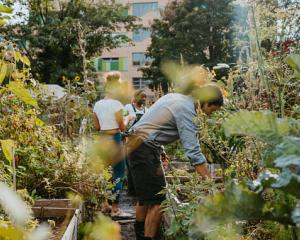Thursday marks World Sight Day, spotlighting the estimated 300 million people globally living with blindness and vision impairment. Bruce Munro talks to That Blind Woman, Julie Woods, and borrows her white cane for a few hours.
Somewhere in front of me, unseen, the pavement falls steeply away to the left.
It is Friday morning, not long before the work day begins. Here I stand, stranded, just a few metres from my house and a full 5km short of the Otago Daily Times' Dunedin offices.
Enveloped in darkness, I sweep searchingly, side to side, with a white cane. What on earth have I got myself into?
''The more competent you become with your orientation and mobility the less you have to concentrate,'' Ms Woods tells me later that day.
''You move into 'unconscious competence', as we call it in the business. But at the moment you are probably consciously incompetent.''
Nicely put.
It had seemed like a good idea . Experience being blind for a day.
Discover what it is like and how others react. The Royal New Zealand Foundation of the Blind spokeswoman had been polite although ultimately unconvinced of the validity and value of ''simulated blindness''.
But Dunedin-based legally blind motivational speaker Julie Woods, aka That Blind Woman, had generously agreed to lend me her second-best cane. She even came up with a pair of wrap-around sunglasses that were soon rendered pitch-black.
Using the cane is a matter of sweeping left when you step forward with your right leg, and then vice-versa, Ms Woods had said.
''And that's the tiring part, to start with,'' she added.
''Because you are concentrating on all the bits of information you are receiving through your cane, or through your ears, or through what people are telling you.
''People do underestimate the amount of energy it takes.''
So here I am. Incompetent but, with a squirt of willpower, edging nervously forward. Twenty minutes later, having tapped and shuffled 200m down the hill to the main road, I encounter my first serious obstacle.
On the far side of the main road is the bus stop from where I want to catch a ride to town. I am neither game enough nor stupid enough to attempt the crossing.
The only thing for it is to get a bus on my side of the road, ride it to the end of the line and then back in to town.
But how do I know when a bus will next arrive? How long will I have to wait?
I listen to traffic flowing past in both directions.
Ms Woods was 18 years old when she developed juvenile macular degeneration. For the next 13 years she was partially sighted.
Then, in 1997, after the birth of her second son she noticed the bathroom's vinyl floor shimmering.
Three months later she was declared legally blind, her remaining sight stolen by inflammation of the retina triggered by an unknown virus.
''I felt like I was trapped inside a body that didn't work properly,'' Ms Woods recalled.
''I felt frustrated and incompetent.''
The experiences of blindness which she brought to her new state of being were ''narrow'', ''limiting'' and ''quite negative''.
But she also had a resilience that made all the difference.
''I could have sat on the couch and people would have said 'Poor Julie, she's blind and can't do anything'.
''But that wasn't the way I wanted to play it.''
The support of family and members of the foundation helped enormously.
''I had to switch off what I couldn't see and switch in to what I could smell, hear, taste and touch.''
Standing at the bus stop I can feel the chill morning wind biting my fingers, nose and cheeks.
There is a whiff of petrol fumes and the steady rumble of cars and trucks. I hear a bus approach but it passes without stopping. Perhaps it is a private charter.
Ten minutes more and another bus pulls up. I hear the doors open, bang both sides with my cane to establish its parameters, and step up.
The driver, on hearing I actually want to go in the opposite direction, offers to help me cross the road.
Grateful, but slightly flustered, as much by my deceit as anything else, I forget the instruction Ms Woods has given on being guided.
''Ask them to hang their arm next to yours and tap the back of your hand with the back of theirs,'' she had advised.
''Then run your hand up their arm and take hold of their elbow. Now you are set to go.''
Instead, I allow myself to be gently man-handled across the road.
The deception deepens when the town-bound bus driver, who I know reasonably well, asks what has happened and I say I do not want to talk about it.
He calls out directions as I move clumsily towards a vacant seat.
''Is it recent?'' asks a woman in a facing seat who sounds in her 60s.
''You don't realise how lucky you are, that you've got it and others don't,'' she offers.
The bus is rolling towards town. I am trying to match the turns and stops with my mental map of the trip.
What got Ms Woods moving was discovering all the things other blind people were able to do.
''It wasn't until I began asking for help ... and seeing other blind people do things that I thought I couldn't do ... that I began to realise maybe I could as well.
''I have a blind friend who mowed his lawns with one shoe on and one shoe off so he could tell where he had mown.
''When I think now that I can't do something, actually that's opting out. That's just being bloody lazy.''
The relearning process was frustrating, like being a child all over again, she said. But each achievement built momentum.
Being able to butter a piece of toast was followed by learning how to make phone calls, touch-type, cook casseroles, read braille, use a computer ...
It was four months before Ms Woods ventured beyond her front gate. This was done with the help of a foundation orientation and mobility (O&M) instructor.
''Family can take you somewhere and point things out. But trained O&M instructors know how you see things and what to look out for and what can give you clues.
''You have to plan out where you want to go and then learn a route.
"You do that with an instructor because they point out the safest places to cross the road, potential dangers ... how to follow the lights and the traffic.
''I use my visual memory and my imagination to create a picture of where I am.''
During the past 16 years, Ms Woods' excursions have included walking the Dunedin half marathon eight times, hot-air ballooning, refereeing nude rugby, and visiting three of the world's seven wonders.
''Once you know you can do something, and you can access the support to do it, the world's your oyster,'' she said.
Disgorged from the bus at the start of George St, I contemplate the yawning 350m gap that still lies between the main street and the newspaper's Stuart St building. I elect to go downhill towards Moray Pl rather than negotiate the Octagon's maze of cafe and bar tables, chairs and signboards.
But before getting under way, I have to figure out exactly where I am on the wide, brick-paved footpath. I begin to sweep with my cane, simultaneously turning slowly anti-clockwise, but leading with my cane lest I bang into someone or something.
I am trying to find some distinguishing feature like a kerbside or shop frontage, but probably look more like I am doing a poor job of casting a magic circle.
''Are you right?'' asks a middle-aged male voice over my left shoulder.
''Am I parallel to the shops?'' I reply to my unseen saviour.
Longitude and latitude determined, I sweep slowly on my way.
I may appear a sluggard, but my brain is doing double-time receiving, assessing and actioning with each footfall, the data pouring in through cane, feet and ears.
I bump into parking meters, stumble on uneven surfaces, fumble for traffic-light pedestrian buttons. But I am making progress and feeling better for it.
It will be two hours since I left home by the time I reach my desk.
And in the quarter hour it takes to negotiate the final three sections of footpath, two road crossings, a lift and a hallway, I am offered assistance five times by unknown members of the public. It is as surprising as it is gratifying.
A lot of people mistakenly think blind people wish they could see, Ms Woods would tell me a few hours hence.
But ironically, she said, total blindness had made her happier and had given her a life she could not have previously imagined.
''When I was partially sighted I didn't belong in the sighted world and I didn't belong in the blind world. I was stuck in no-man's land.
''Going blind gave me a huge sense of belonging and made me happier because I got the support I needed.
''My experience is that totally blind people are particularly good at switching in to that new way of being.
''We focus on what we can do, and learn to do things in a different way.''
For Ms Woods that has led to her becoming a life coach, author and motivational speaker known throughout New Zealand as That Blind Woman.
Attitude is critical, she says.
''It's hugely important in terms of reaching your potential.
''In fact, being blind might even fast-track it.
''It's a choice. They're all moments of choice. When opportunities come your way you can say 'No', or you can say 'Why not'.''












